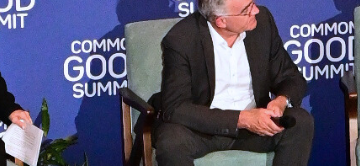The world's economies have not been idle in the face of climate change. Companies and consumers are endeavouring to reduce their carbon footprint by investing in energy efficiency and changing their travel plans. Financial institutions are pressed to disinvest shares in fossil fuel industries by the “Keep it in the ground” campaign launched by NGOs and the media. In the last decade many countries, particularly EU Member States, have invested heavily in renewable energy sources such as wind and solar power, through generous feed-in tariffs, public tenders and mandatory renewable portfolio standards. China installed about 23 gigawatts of new wind power capacity in 2014, almost half of the 53 gigawatts installed worldwide. Rich countries have pledged to contribute up to $10 billion a year to the UN Green Climate Fund, with the aim to eventually reach $100 billion. This money is to be used to assist developing countries in adaptation and mitigation practices.
Spending money has proven easier than pricing carbon, as economists would prefer. It seems unlikely that the COP 21 participants will reach consensus on taxing carbon dioxide emissions or setting tradable emission permits. They seem more inclined to subsidise the reduction of greenhouse gas emissions than to penalise their production. Will this prove successful? Can we avoid pricing carbon by massive public support for decarbonised sources of energy? Economic analysis suggests that the answer is no
In a recent paper we investigated the impact of subsidies to renewable sources of energy, particularly feed-in tariffs, on the energy mix. Solar and wind power sources are intermittent in that the electricity produced from wind turbines and photovoltaic panels varies over time and weather conditions. This makes power dispatching challenging because electricity is not storable on a large scale. Electricity must therefore be produced at the same time it is consumed. In other words, supply must match demand in real time. The fact that most consumers read a constant price in their electricity bill does not help: the price does not reflect variations in supply and therefore even consumers who could react to supply variability do not. Intermittency in electricity supply combined with a retail electricity price that is constant in time forces electricity providers to back-up new wind farms and PV installations with reliable sources of energy, mostly thermal power plants burning fossil fuel. The support to renewable energy through generous feed-in tariffs and ambitious renewable portfolio standards does increase investment in new wind and solar power production equipment. Yet it also reduces the cost of providing electricity on windy and sunny days. This translates into lower electricity prices in the wholesale market, as experienced in Germany when wholesale prices are sometime close to zero and even negative. Cheap electricity is not good for the climate, specifically because of the back-up necessity: consumers keep on consuming large quantities of electricity produced from fossil fuel to cope with intermittency. As long as our energy mix is not totally free of pollution, we must reduce electricity consumption, which requires higher electricity prices. By contrast, subsidies push energy prices down, and taxes up. The best way to both lower demand and produce a greener mix is to price greenhouse gas emissions from burning fossil fuel.
Cutting greenhouse gas emissions without slowing economic growth down is the main challenge of the next climate conference. Carbon-free sources of energy such as wind and solar power are certainly key solutions. We must keep on investing in renewables, installing windmills and solar panels. But not just by pouring in subsidies. Pricing greenhouse-gas emissions should be given priority to avoid the negative side effects of green subsidies on the energy mix.
The objective of the COP21 must be the reduction of greenhouse gas emissions at the least cost. The emphasis on renewable energy sources is a wasteful confusion of the means with the ends. We do certainly need innovative technologies to reduce greenhouse emissions at the lowest cost, but it should come with the right public policy.






Add new comment